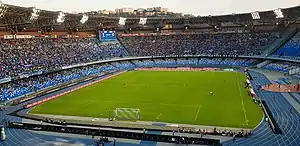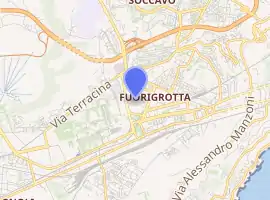Stadio San Paolo
Stadio San Paolo, officially known as Stadio Diego Armando Maradona,[1] is a stadium in the western Fuorigrotta suburb of Naples, Italy, and is the third largest football stadium in Italy,[2] after Milan's San Siro and Rome's Stadio Olimpico, and the largest to be used by only one team. For the 1960 Summer Olympics in Rome, the stadium hosted the football preliminaries. It is currently used mostly for football matches and is the home stadium of S.S.C. Napoli. Constructed in 1959, the stadium was extensively renovated in 1989 for the 1990 World Cup and again in 2018. The stadium currently accommodates 55,000 spectators.
Stadio Diego Armando Maradona | |
 | |

| |
| Former names | Stadio del Sole |
|---|---|
| Location | Naples, Campania, Italy |
| Coordinates | 40.827967°N 14.193008°E |
| Owner | Comune di Napoli |
| Executive suites | 20 |
| Capacity | 54,726 all seated |
| Record attendance | 90,736 (Napoli vs. Juventus, 15 December 1974) |
| Field size | 110 m × 68 m (361 ft × 223 ft) |
| Surface | Grass |
| Construction | |
| Broke ground | 1948 |
| Built | 1948–1959 |
| Opened | 6 December 1959 |
| Renovated | 1989–1990, 2019 |
| Architect | Carlo Cocchia, Luigi Corradi |
| Tenants | |
| S.S.C. Napoli (1959–present) Italy national football team (selected matches) | |
History
Even with Napoli in Serie C1 during the 2005–06 season, Napoli achieved the feat of having the 3rd highest average home attendance in Italy for the season, with only two Serie A clubs, Milan and Internazionale having higher attendances. Napoli's final game of the season drew a crowd of 51,000 which now stands as a Serie C all-time record.
The San Paolo Stadium also hosted Italy's Euro 2008 Qualifier vs Lithuania on 2 September 2006, with the possibility of other qualifiers to be played there in the future.

The stadium was renovated in preparation for the 2019 Summer Universiade; this included replacing metal fencing with glass barriers and replacing seats. This means the stadium's capacity was reduced from 60,240 to 54,726.[3] The stadium hosted the opening ceremony and athletics event.
Following the death of former Napoli player Diego Maradona on 25 November 2020, the city's mayor Luigi de Magistris and Napoli president Aurelio De Laurentiis proposed to rename the stadium "Stadio Diego Armando Maradona", and on 4 December 2020, the proposal was passed by the City Council.[1]
Events
1990 FIFA World Cup
.jpg.webp)
The stadium was one of the venues of the 1990 FIFA World Cup, and held five matches. The first two were Argentina’s Group B matches: the first was against Soviet Union on June 13 winning 2-0, and the second was against Romania on June 18 ending in a 1-1 draw. The next two were Cameroon matches: the first was a Round of 16 match against Colombia on June 23 winning 2-1 after extra time, and the second was a Quarter-finals match against England on July 1 losing 3-2 after extra time.
The fifth and last was the semi-final between Argentina and Italy on July 3. Argentina's superstar Diego Maradona, who played for Naples's Italian 1st division team and was a hero to their supporters, asked Napoli fans to cheer for Argentina. The Napoli tifosi responded by hanging a giant flag in their "curva" of the stadium saying "Maradona, Naples loves you, but Italy is our homeland".[4] Maradona later said he was touched that Napoli was the only stadium during that World Cup where the Argentinian national anthem was not jeered. The match finished 1–1 after extra time. A penalty shootout ensued, with Maradona fittingly scoring the winning penalty for Argentina.
References
| Wikimedia Commons has media related to Stadio Diego Armando Maradona (Naples). |
- "Official: Stadio Diego Armando Maradona". Football Italia. 4 December 2020.
- "Some of the world's scariest places to play or watch football". BBC News. Retrieved 11 November 2018.
- "Naples: The great... no, it's just repairs for San Paolo – StadiumDB.com". stadiumdb.com.
- Maradona, Diego (2004). El Diego, pg. 166.

